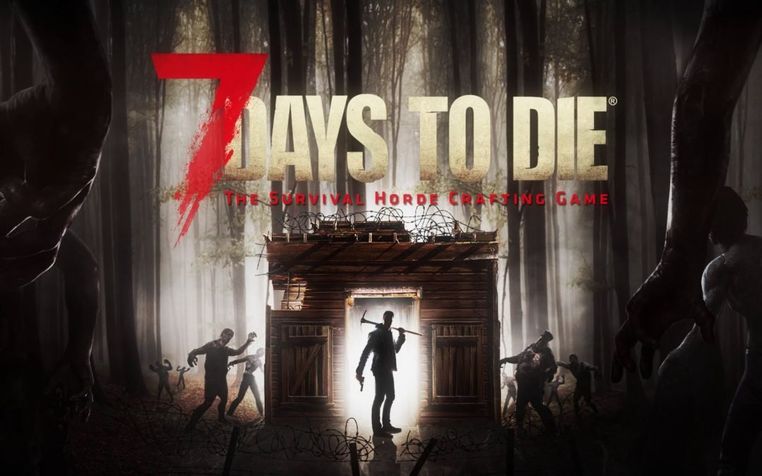7 Days To Die
I wake up by the side of the road. I am naked, alone, and blinded by the light. Beside me, there is a house. Is it my house? Is this the burnt out rubble of my life? I’m taking over this house. I’m taking over this life, and whether it was ever mine to begin with seems to be beside the point. Whatever it was, and whatever I was, are behind me now. This is the zombie apocalypse, and I am alone.
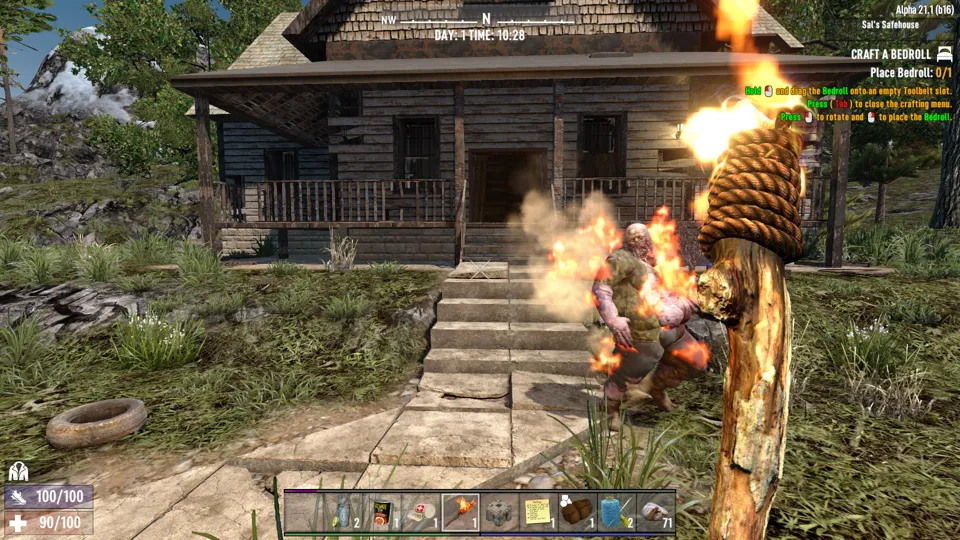 Not technically alone
Not technically alone
Of course, I don’t have to be alone if I don’t want to be. 7 Days to Die is a zombie apocalypse survival crafting game. You play as a survivor, or at least, as a prospective survivor. As with any zombie game, survival is really a temporary state of being, as the world is replete with things that would like to end that state as quickly and as thoroughly as possible. To deal with them, the player needs to scavenge for resources, craft what they need, and build a zombie-proof base. Uniquely, however, 7 Days to Die offers the chance to play multiplayer, meaning rather than dying alone, I have the opportunity to die while my friend loots my corpse and runs away in the true zombie apocalypse experience.
Perhaps also uniquely, 7 Days to Die makes every object in its world interactable in some way. Everything can be smashed, dug into, or picked apart for resources, and how the player does so impacts what yield they ultimately receive. The world 7 Days to Die creates is one not limited by rules, but instead, by a player’s patience and creativity.
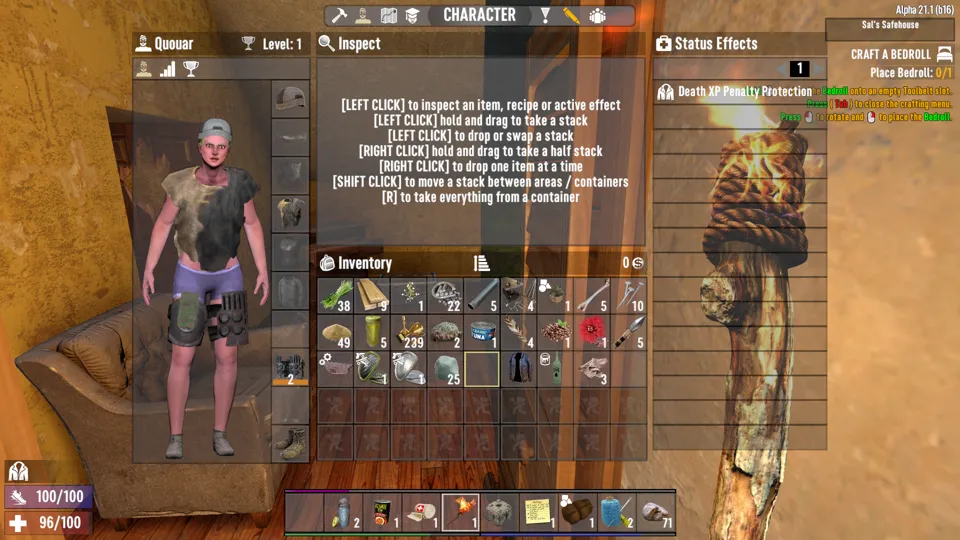 My creativity is wearing purple underwear.
My creativity is wearing purple underwear.
This is not my first foray into zombie games, nor is it my first foray into crafting or base building. It’s not an exaggeration to say I grew up on zombie apocalypse games, and zombie media is still some of my favourite media. I enjoy imagining what happens to the world as it disintegrates, and what happens on the other side. It’s the dynamics of how populations panic, of how they survive, and the stories that happen along the way that keep me enthralled. I am, as you can imagine from all my other reviews, entranced by theory and the question of what happens when everything falls apart. Zombie media does that for me, with the added delight of the many, many memes along the way.
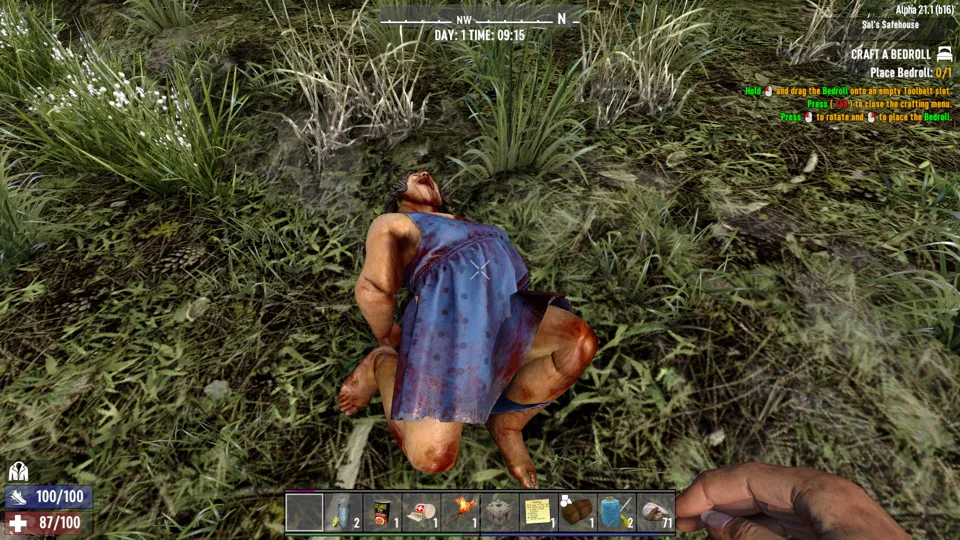 Also Bethesda-esque death animations
Also Bethesda-esque death animations
7 Days to Die is unquestionably a zombie game. It’s crowded with them, wandering in homes, clogging shops, and sneaking up on you when you least expect it. All the mechanics of an individual survival are there. When playing 7 Days to Die, though, I find myself returning over to the question I asked at the beginning of this review - why am I alone? What is the story of the plague in this world, and why am I so totally alone?
To be clear, I know 7 Days to Die has a multiplayer component. There is the option to raid others’ bases, or to form alliances with friends. However, if you’re like me and don’t have friends with the game, and don’t trust strangers enough to put your gameplay experience in their hands, you’re left with a barren world. 7 Days to Die is not a game with NPCs, nor is it a game with external interaction. There is a trader, but the trader could just as easily be replaced with a vending machine for all the interaction they have with you. There are no social dynamics to deconstruct. There is no new apocalyptic order to build. You are, for all intents and purposes, alone.
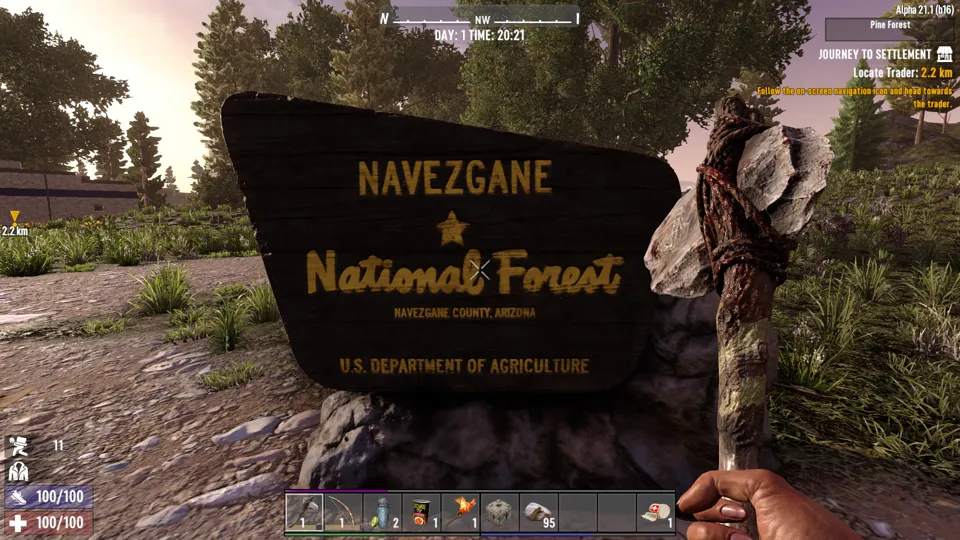 Zombies are poor company.
Zombies are poor company.
This leaves you with the game mechanics, and only the game mechanics. How, then, do these stack up? As a survival game, it does fine. It has the usual requirements of food, water, and shelter. There’s a frustration here, as the game doesn’t seem to believe in the existence of water bottles or canteens, and its timeline for starvation seems weirdly accelerated. I found the lack of ability to sleep disconcerting, and its in this departure from reality that the game really starts to fall apart.
It’s when I think about crafting and the world that the game has built to craft within that I start to lose interest in what this game actually is. 7 Days to Die has the philosophy that all things are crafting materials waiting to happen, and that everything in the world can be altered. It’s a fun philosophy, but one that, when I start to think about it in any real depth, creates a world that is impossible to get lost in. The character you play is clearly not human, as evidenced by how quickly they starve and how they are unable to sleep. They can hack apart a car with a stone axe, and contentedly munch on year old sandwiches. Something about them attracts the ravenous hordes, no matter how silent they keep their base, and no matter how many lights they douse. This is a zombie apocalypse that forces conflict and that throws the undead at you.
Why, then, am I alone? If the forest is so full of zombies that it’s impossible to clear them all, and that I can’t step outside without getting attacked, why am I alone? Why do I wake up, naked and afraid, and why am I alone?
It might seem like I’m missing the point of the game here - it’s a crafting game with a zombie veneer on it - but when all I’m left with is the mechanics, I start picking at the seams. What happened to this world that I can wake up alone, but all the canned food I would expect to see here is long gone? Why is it that there are enough zombies to be a problem, but none can be harvested for anything useful? Why are there still so many available resources, but no one else competing for them?
As I played, I was reminded of two different games, and the comparisons I could draw between them. On the one hand, there’s the obvious comparison to Grounded, another survival crafting game. Grounded does not take the approach that all the world is a crafting stage. Instead, there are specific resources that need to be gathered, and specific and increasing ways in which to gather them. Crucially, the various enemies that surround the player are themselves resources, forcing the player to think tactically not only about how and when to engage with the world, but why. 7 Days to Die doesn’t do that. The world has resources, sure, but so does the ground under your feet. When enemies don’t give resources, what’s the incentive to engage, or indeed, to think of them as anything other than a nuisance? 7 Days to Die has a vast world, but much of it is just a slog as you trek from one resource node to the next, hoping you don’t get ambushed along the way.
And that brings me to This War of Mine, another survival horror crafting game. There, you play as a group of survivors, scavenging resources to cobble together a shelter while you try to survive a war. The shelter becomes more and more ornate, but never truly safe. Starvation is always lurking in the dark corners, and death comes stealthily on whispered wings. It is weirdly similar to 7 Days to Die, but crucially, it gives me a reason to care. When I leave my group members to scavenge, I don’t know what will happen to either them or me. One of its survival mechanics is morale, and morale, like food and warmth, can kill. Each foray into the unknown brings with it the knowledge that I am not only out for myself, but for all those relying on me. It makes my heart pound every time.
In 7 Days to Die, I am alone. It doesn’t matter if I fail. The only one who knows I’m here is me, and I am no one in a dead world.
The flaw with 7 Days to Die isn’t in its survival mechanics - though they are flawed - nor in its crafting. It is in that it exists in a world without motivation. The only thing for me to do is build an increasingly elaborate base, but to what end? So I can survive another day? But what is surviving another day when there’s nothing left to live for?
I am alone.
Developer: The Fun Pimps
Genre: Survival, Horror, Crafting
Year: 2013
Country: United States
Language: English
Play Time: Until You Get Bored, I Guess?
Youtube: https://youtu.be/zFXwz3Cja8E
